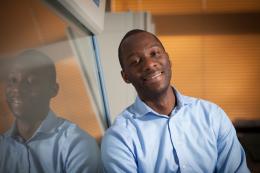Chris Alabi

Breaking rules to improve drug discovery and delivery
One of the unspoken rules of higher education is that getting tenure is more important than just about anything else an assistant professor can do. This is why it is a bit surprising to hear Chris Alabi, assistant professor of chemical and biomolecular engineering (CBE) at Cornell, say “I care much more about the health of my research program than I do about tenure. Research is about discovery, and that is what I get excited about.”
Alabi, who joined the Robert Frederick Smith School of Chemical and Biomolecular Engineering faculty in 2013, has had plenty to be excited about since he got to Ithaca. His lab is making great strides in designing new ways to make synthetic, bio-active polymers. “I am making polymers that look like the biopolymers in our bodies, but are instead created with synthetic molecules designed in our lab,” says Alabi. “We want to use what the body already makes as a guide, but then improve upon it by adding one modification at a time in a very controlled process. By creating these synthetic biopolymers from the bottom up in an iterative and controlled manner, we can precisely tune their size, composition and properties. This level of control is important, especially when these bio-active polymers are used as scaffolds to carry drugs exactly where we need them to go.”
A second line of research in Alabi’s lab involves understanding the underlying principles that dictate how macromolecules and nanoparticle therapeutics move and interact in complex biological environments. In plain English, Alabi wants to know and measure everything he can about the properties of drug-delivery systems. For a targeted treatment to work, the active compounds need to get into specific compartments in the cells where they can do the most good. To do this, the targeted treatment must be able to sense, respond and adapt to the local environmental cues in order to reach the desired site of action. Alabi’s research aims to use the synthetic bio-active polymers (from his first line of research) and the knowledge gained in this second line of research to engineer in physicochemical properties that can improve the biological transport and overall efficiency of drug delivery systems. In this way, the development of specific drug delivery systems can be made less scattershot and more efficient and effective.
Ithaca is a long way from Alabi’s hometown near Lagos, Nigeria. His path from Nigeria to Upstate New York passed through England for his A Level schooling; through the New York City area for a B.S. in Chemical Engineering at Stevens Institute of Technology and a B.S. in Chemistry from New York University (NYU) in 2004; through Pasadena, California for a Ph.D. in Chemistry at the California Institute of Technology in 2009; and then through one last stop in Cambridge, Massachusetts for a postdoctoral fellowship at the Massachusetts Institute of Technology (MIT). Alabi joined the faculty at Cornell’s Smith School of Chemical and Biomolecular Engineering in 2013.
At each step of the process Alabi has known his eventual goal. “I have loved chemistry from the get go,” says Alabi, “but I have always known I had to be an engineer to do anything practical with it. My goal has always been to make stuff that people could use.” Alabi joined the faculty at Cornell because it was the perfect marriage of chemistry and chemical engineering. “A lot of places I interviewed preached being collaborative, but Cornell truly is,” says Alabi. “I thought I could bring something unique to CBE. The department here is open enough that I could find collaborators from different fields and make some valuable contributions to some tough problems.”
One reason Alabi was so sharply focused on finding a collaborative place to be a professor was the experience he had during his post-doctoral fellowship at MIT. Alabi had a coveted spot in the lab of biochemical engineer Robert Langer. Langer has more than 1000 patents and has started many companies. He has also been awarded the highest honor in engineering, the Charles Stark Draper Prize. Langer received his B.S. in Chemical Engineering from Cornell in 1970.
“I learned the full importance of diversity in the Langer lab,” says Alabi. “There are people in the Langer lab from many different fields and having access to that range of knowledge makes all the work better.”
When Alabi came to interview at Cornell, the daughter of the director of the Smith School of Chemical and Biomolecular Engineering babysat for Alabi’s young son. “I knew right away this was the sort of place for me,” says Alabi. “The people in CBE are great both personally and professionally. The opportunities for collaboration here are endless.” In the end, what Alabi hopes to accomplish with his work at Cornell is to improve the drug discovery process. Understanding how existing drugs interact with cells or with proteins within the cell is essential knowledge for creating new therapeutic macromolecules step-by-step in the lab. “In the end, any process we come up with must be scalable for it to have any real impact,” says Alabi. “If our work pans out, we hope to fundamentally change the way researchers and industrial scientists approach drug discovery.”
As Alabi discusses the possibilities, his voice rises just a bit and he speaks just a little faster. It is obvious that what he said at the beginning of our conversation—that discovery is what he gets excited about—is true. If his work goes the way he hopes it will, tenure will take care of itself.

